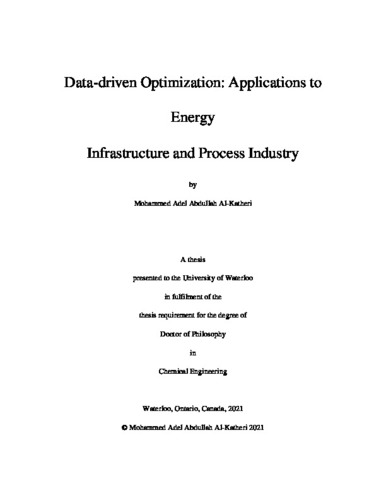| dc.description.abstract | Nowadays, the existence and ease of access to massive amounts of data encourage proposing data-driven solutions. As optimization has always been based on the interchange between models and data, high-level optimization tasks such as planning and scheduling will extremely benefit from information mined from massive data sets. The development of big data tools (i.e., machine learning) has proven superiority over traditional data tools in dealing with vast amounts of data, data with undefined structure and capturing important information from data in a very efficient and computationally tractable manner. Therefore, in this work, big data tools are implemented to address the challenges associated with planning models of energy infrastructure that incorporate renewable resources and chemical engineering processes, namely, uncertainty handling, multiscale modelling, and unit process equation complexity.
A Data-driven stochastic optimization framework that leverages big data in design and operation of power generation planning is proposed. A k-means clustering algorithm is adopted to generate uncertainty scenarios for the stochastic optimization framework. These scenarios are used as inputs to the stochastic model where the proposed model is formulated as a mixed integer linear program (MILP) and solved using GAMS. The proposed approach is applied to different power planning models that include unit commitment (UC) characteristics where the size of uncertainty scenarios is reduced. Results show that the proposed approach is an effective tool to generate reduced size stochastic scenarios.
The design and operation of energy hub problem involves the integration of decision levels with different time scales that usually lead to multiscale models which are computationally expensive. The multiscale (i.e., planning and scheduling) energy hub systems that incorporate renewable energy resources become more challenging to model due to a high level of intermittency associated with renewable energy. A mathematical programming-based general clustering approach is applied to reduce the size of multiple attributes demand data and tackle the computational complexity of multiscale energy hub problems. Multiscale with multiple attributes energy hub incorporating hydrogen storage is modelled as a MILP stochastic optimization problem under wind uncertainty. Different case studies are generated under different environmental consideration to assess the efficiency of the clustering approach and stochastic formulation. Assessments conclude that the clustering approach is an effective tool to reduce the size of the original model while maintaining good results.
Recent advancements in supervised machine learning tools have demonstrated their ability to achieve accurate and efficient prediction results. Therefore, in this study, these tools are employed as alternative approaches to model a specific application in the gas industry. The chosen application is a natural gas condensate stabilization process based on operating data. Natural gas condensate treatment involves condensate stabilization process in which light end components are removed and thus condensate vapour pressure is reduced to meet storage and transportation specification. Different supervised machine learning models are developed to predict the performance of two industrial condensate stabilizer units. Large datasets of the two different industrial condensate stabilizers, including operating data of input-output variables, are utilized to develop and evaluate these models. The main purpose of developing these machine learning models is to predict the important parameters of the final stabilized liquid. Results attained from this study showcase the capability of the developed models to offer reliable and accurate predictions. A data-driven surrogate-based optimization framework is developed, where the generated machine learning models can serve as a convenient replacement for detailed first principle models, to find the optimal values of the variables corresponding to the minimal operational energy consumption. The proposed framework can benefit the gas industry to simultaneously achieve process efficiency, profitability, and safety. | en |

